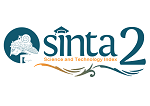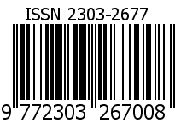- Focus and Scope
- Section Policies
- Peer Review Process
- Publication Frequency
- Open Access Policy
- Screening for Plagiarism
- Reference Management
- Journal Archiving
Focus and Scope
Jurnal Kajian Informasi & Perpustakaan contains articles written from research and study reports on Information and Library Science. Jurnal Kajian Informasi & Perpustakaan is published twice annually (June and December) by the journal editors from the Library Science Study Program Faculty of Communication Science, Universitas Padjadjaran in cooperation with the Ikatan Sarjana Ilmu Perpustakaan dan Informasi Indonesia (ISIPII).
Every received article will be reviewed by the journal editors and external editors and reviewers who are competent in each related field. The review uses double-blind peer review before the journal is published. The study area of this journal are librarianship, information and archives, including:
- Library Management. The control and supervision of a library or library system, including planning, budgeting, policymaking, personnel management, public relations, and program assessment, with responsibility for results.
- Digital Library and Repositories. A library in which a significant proportion of the resources are available in machine-readable format, accessible by means of computers. The physical space (building, room, area) reserved for the permanent or intermediate storage of archival materials. To preserve and protect archival collections, modern repositories are equipped to meet current standards of environmental control and security.
- Organization of Information. Information organization establishes the conceptual framework for organizing and retrieving information, including the study of systems and their purposes and structures, formats, standards, and vocabularies.
- Information Services. Generally information services can be divided into two categories: library public user services and library technical user services. Library public user services refer to circulation, bibliographic instructions, distance learning, government documentation, reference and special collection. Library information user services focuses on procedures and operations of maintaining, developing and supporting library collection and services behind the scene such as acquisition, cataloguing, classification, inter library loan, document delivery and serial systems.
- Knowledge Management. Process of creating (generating, capturing), storing (preserving, organizing, integrating), sharing (communicating), applying (implementing), and reusing (transforming) organisational knowledge to enable an organisation 5 to achieve its goals and objectives.
- Media and Information Literacy. constitutes a composite set of knowledge, skills, attitudes, competencies and practices that allow effectively access, analyze, critically evaluate, interpret, use, create and disseminate information and media products with the use of existing means and tools on a creative, legal and ethical basis
- Information and Media Preservation. Prolonging the existence of library and archival materials by maintaining them in a condition suitable for use, either in their original format or in a form more durable, through retention under proper environmental conditions or actions taken after a book or collection has been damaged to prevent further deterioration.
- Infometrics. The use of mathematical and statistical methods in research related to libraries, documentation, and information.
- Information Policy. A governing principle, plan, or course of action concerning information resources and technology adopted by a company, organization, institution, or government
- Documentation System. The process of systematically collecting, organizing, storing, retrieving, and disseminating specialized documents, especially of a scientific, technical, or legal nature, usually to facilitate research or preserve institutional memory.
- Archive Management. refers to the office or organization responsible for appraising, selecting, preserving, and providing access to archival materials.
- Information Technology in Information Institute. Information and communication technologies (ICT) facilitate the process of identification, collection, storing, processing and disseminating of information in libraries/information centers/information institute.
Section Policies
Artikel
Peer Review Process
All submitted articles considered for publication undergo peer-review who are expert in the field. The review uses double blind peer review before the journal is published. Peer review assists editors in making editorial decisions and, through editorial communications with authors, may assist authors in improving their articles. Only qualified referees will be invited to review an article. Any article received for review is a confidential document and will be treated as such; it will not be shown to or discussed with others except if authorized by the Editor-in-Chief. Reviews would be conducted objectively and observations formulated clearly with supporting arguments so that authors can use them for improving the article. Reviewers will identify relevant published work that has not been cited by the authors and will also notify the editors of any substantial similarity or overlap between the article and any other article (published or unpublished).
Publication Frequency
Jurnal Kajian Informasi & Perpustakaan is published twice annually (June and December) by the journal editors from the Library Science Study Program, Faculty of Communication Science, Universitas Padjadjaran in cooperation with the Ikatan Sarjana Ilmu Perpustakaan dan Informasi Indonesia (ISIPII).
Open Access Policy
Access rights of entire publication content of this journal is open access for non-commercial purposes. A Creative Common Attribution Share-Alike 4.0 (CC-BY-SA 4.0) license applied to all contents published in this journal. The users are free to use the work, subject to proper attribution of authorship and ownership of the rights. Authors may use their material in presentations and subsequent publications they write or edit themselves, provided that Jurnal Kajian Informasi & Perpustakaan is referenced in writing and is acknowledged as the original publication.
Screening for Plagiarism
Before submitting an article, the authors should check it by using a plagiarism checker application. All received articles which are published in the Jurnal Kajian Informasi & Perpustakaan have been through plagiarism checking process by using turnitin.com application. If an article is indicated as a plagiary, it will be rejected and will not be reviewed.
Reference Management
The authors recommended using the Reference Manager application, ex: Mendeley, Zotero, etc. The writing format that used in Jurnal Kajian Informasi & Perpustakaan follows the format applied by APA 6th Edition (American Psychological Association).
Journal Archiving
This journal utilizes the Indonesia One Search (IOS) and Indonesian Scientific Journal Database (ISJD) system to create a distributed archiving system among participating libraries and permits those libraries to create permanent archives of the journal for purposes of preservation and restoration.











2.png)
.png)




